|






Click the flag
Meet our special
U.S. Publishers
|
Attachment
Theory, Disorders & Treatment
Featured
Books in this Category / Main
Booklist

Featured
Books
|
Attaching In Adoption:
Practical Tools for Today's Parents. Deborah Gray, $29.95
Attaching In Adoption is a comprehensive
guide for prospective and actual adoptive parents on how to understand and care
for their adopted child and promote healthy attachment.
This classic text provides practical
parenting strategies designed to enhance children's happiness and emotional
health. It explains what attachment is, how grief and trauma can affect
children's emotional development, and how to improve attachment, respect,
cooperation and trust. Parenting techniques are matched to children's emotional
needs and stages, and checklists are included to help parents assess how their
child is doing at each developmental stage. The book covers a wide range of
issues including international adoption, Fetal Alcohol Spectrum Disorder, and
learning disabilities, and combines sound theory and direct advice with case
examples throughout.
This book is a must read for anyone
interested in adoption and for all adoptive families. It will also be a
valuable resource for adoption professionals. |
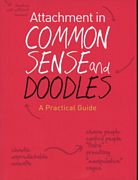
|
Attachment in Common Sense and
Doodles: a Practical Guide. Miriam Silver, $22.95
Attachment is a word used to describe a
simple idea — the relationship with someone you love or whose opinions are
important to you — so why is so much of the language relating to attachment so
obscure, and why is it so challenging to help children who lack healthy
attachment bonds?
Attachment in Common Sense and
Doodles
aims to bring some clarity and simplicity to the subject. Providing grounded
information and advice accompanied by a series of simple 'doodles' throughout,
it explains attachment in language that is easy to understand and describes how
to apply this information in everyday life. It describes how the attachment
patterns in children who are adopted or fostered differ, summarises the latest
research in the field and provides advice on how to repair attachment
difficulties and to build secure, loving relationships.
Covering all of the 'need to know' issues including how to spot attachment
difficulties, build resilience and empathy and responding to problematic
behaviour, this book will be an invaluable resource for families and
professionals caring for children who are fostered, adopted or who have
experienced early trauma. |
|
Attachment
and Development. Susan Goldberg, $66.95
A detailed examination of the factors
that contribute to shaping early attachment and of the effects of
attachment on development, including social competence, mental health
and physical health. Special emphasis is given to newly emerging
research on the role of cognition, emotion and psychobiology in
internal working models of attachment. |
Back to top
|
Attachment: Expanding the Cultural Connections. Edited by Phyllis Erdman & Kok-Mun Ng, $87.50
Attachment: Expanding the Cultural Connections is a comprehensive and valuable resource for understanding the role of cross-cultural perspectives in attachment theory and culturally defined patterns in relationships. |
|
Attachment
from Infancy to Adulthood: the Major Longitudinal Studies. Klaus
Grossman, Karin Grossman & Everett Waters, editors; $32.50
This volume provides unique and valuable firsthand accounts of the
most important longitudinal studies of attachment. Presented are
a range of research programs that have broadened our understanding
of early close relationships and their role in individual adaptation
throughout life.Themes addressed include the complexities of designing
studies that span years or even decades; challenges in translating
theoretical constructs into age-appropriate assessments; how Bowlby's
original models have been refined and expanded; and how attachment
interacts with other key influences on development. |
|
Attachment Parenting:
Developing Connections and Healing Children. Arthur Becker-Weidman
& Deborah Shell, $67.95
Attachment Parenting describes a comprehensive approach to parenting children who have a history of neglect, abuse, orphanage care, or other experiences that may interfere with the normal development of attachment between parent and child. Grounded in attachment theory, Attachment Parenting gives parents, therapists, educators, and child-welfare and residential-treatment professionals the tools and skills necessary to help these children.
With an approach rooted in dyadic developmental psychotherapy, which is an evidence-based, effective, and empirically validated treatment for complex trauma and disorders of attachment, Arthur Becker-Weidman and Deborah Shell provide practical and immediately usable approaches and methods to help children develop a healthier and more secure attachment. Chapters on sensory integration, art therapy for parents, narratives, and Theraplay give parents specific therapeutic activities that can be done at home to improve the quality of the child's attachment with the parent. And chapters on neuropsychological issues, mindfulness, and parent's use of self will also help parents directly. The book includes two chapters by parents discussing what worked for them, providing inspiration to parents and demonstrating that there is hope. |
Back to top
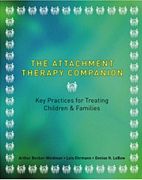
|
The Attachment Therapy Companion: Key
Practices for Treating Children & Families. Arthur
Becker-Weidman, Lois Ehrmann & Denise LeBow, $29.50
Here in a single accessible guide, is a
comprehensive go-to resource on the foundational principles and treatment
guidelines for doing attachment therapy. It provides all the nuts and bolts a
clinician needs to be familiar with to provide effective, informed,
attachment-focused treatment to children and families.
Complex trauma and developmental trauma disorder are also covered in depth, as
well as up-to-date information on how brain science has changed our
understanding of relationships and developmental functioning, and, in turn,
phases of treatment and intervention options. By delineating the standards
of care for treating attachment and trauma disorders, this book provides
clinicians with a comprehensive framework to assess, develop, and evaluate the
best approach to helping their clients. |
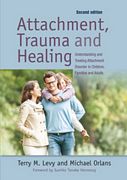
|
Attachment, Trauma, and Healing: Understanding and
Treating Attachment Disorder in Children, Families, and Adults, 2nd Edition.
Terry Levy & Michael Orlans, $49.95
Levy and Orlans' classic text provides a comprehensive
overview of attachment theory, how attachment issues manifest, and how they can
be treated. The book covers attachment-focused assessment and diagnosis,
specialised training and education for caregivers, treatment for children and
caregivers and early intervention and prevention programmes for high-risk
families. The authors explain their unique models of 'corrective attachment
therapy' and 'corrective attachment parenting', and provide practical guidance
on goals and techniques for clinicians who work with maltreated and attachment
disordered children and families. This second edition incorporates advances in
the fields of child and family psychology, with substantial new sections on
interpersonal neurobiology, adult and couple treatment, the application of
positive psychology. |
|
Attachment in
the Young Child. Kinship Center, $95.50 DVD format
This video presents ways to increase
attachment between a new caregiver and a child who has experienced
early childhood neglect, separation or loss. Expert presenters describe
the effects of separation and outline specific techniques for attachment-based
parenting. |
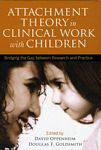
|
Attachment Theory
in Clinical Work with Children: Bridging the Gap between Research
and Practice. Edited by David Oppenheim & Douglas Goldsmith,
$27.50
This book reviews state-of-the-art knowledge
on attachment and translates it into practical guidelines for therapeutic
work. Leading scientist-practitioners present innovative strategies
for assessing and intervening in parent-child relationship problems;
helping young children recover from maltreatment or trauma; and
promoting healthy development in adoptive and foster families. Detailed
case material in every chapter illustrates the applications of research-based
concepts and tools in real-world clinical practice. |
Back to top
|
Attachment-Based Family Therapy for
Depressed Adolescents. Guy Diamond, Gary Diamond
& Suzanne Levy, $96.95
Attachment-Based Family Therapy (ABFT)
is the only empirically supported family therapy model designed to treat
adolescent depression. This book describes clinical strategies for therapists,
as well as the theoretical basis of the approach and the evidence base that
supports it. ABFT emerges from interpersonal theories that suggest adolescent
depression and suicide can be precipitated, exacerbated, or buffered against by
the quality of interpersonal relationships in families. ABFT aims to repair
interpersonal ruptures and rebuild an emotionally protective, secure-based,
parent–child relationship.
The treatment initially focuses on
repairing or strengthening attachment and then turns to promoting adolescent
autonomy. In particular, the authors delineate five treatment phases, or
"tasks," which each have distinct goals and strategies. Thus, while
the model is trauma-focused and process-oriented, it includes a structure and a
clear roadmap for facilitating the reparative process. The chapters blend
empirical research with clinical guidance, illustrative vignettes, and a case
study. With its unique emphasis on the depressed adolescent's need for
attachment and autonomy, this book will show family therapists how to create
in-session, corrective attachment experiences where adolescents seek — and
parents provide — love and support. |
|
Attachment-Based Teaching: Creating a Tribal Classroom.
Louis Cozolino, $32.00
Human brains are social, and a student's ability to learn
is deeply influenced by the quality of his or her attachment to teachers and
peers. Secure attachment relationships not only ensure our overall well-being,
but also optimize learning by enhancing motivation, regulating anxiety, and
triggering neuroplasticity. This unique, important book presents a classroom
model of secure attachment, exploring how teacher-student rapport is central to
creating supportive, "tribal" classrooms and school communities. |
Back to top
|
Attachment-Focused
Family Therapy. Daniel Hughes, $39.00
Daniel Hughes, an eminent clinician and
attachment specialist, draws on more than 20 years of clinical experience
to present this comprehensive, effective, and accessible treatment
model for working with all members of a family to recognize, resolve,
and heal personal and family problems using principles from theories
of attachment and intersubjectivity. Grounded in the fundamental
principle of parents facilitating the healthy emotional development
of their children, Attachment-Focused Family Therapy is
the first book of its kind to offer therapists a complete manual
for using attachment therapy with families.
Attachment-Focused Family Therapy Workbook. Daniel Hughes, $39.95
This companion workbook takes readers beyond the fundamental principles described in Attachment Focused Family Therapy to offer invaluable training exercises, core skills and treatment techniques for clinical practice. An accompanying DVD demonstrates these strategies in-session.
|
|
|
Attachment-Focused
Parenting: Effective Strategies to Care for Children. Daniel
Hughes, $42.00
An expert clinician brings attachment theory into the realm
of parenting skills.
Attachment security and affect regulation have long been buzzwords
in therapy circles, but rarely are they effectively applied to
basic parenting skills. Here, a leading attachment specialist
brings attachment work inside the therapy room to the outside,
equipping caregivers with practical parenting techniques rooted
in attachment theory and research. |
Back to top

|
Becoming
Attached: First Relationships and How They Shape Our Capacity to Love.
Robert Karen, $29.50
In Becoming
Attached, Robert Karen offers fresh insight into some of the
most fundamental issues of emotional life. He explores such questions
as: What do children need to feel that the world is a positive place
and that they have value? What are the risks of day care for children
under one year of age, and what can parents do to manage those risks? |
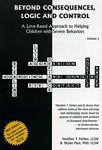
|
Beyond Consequences,
Logic and Control: a Love-Based Approach to Helping Children with
Severe Behaviors. Heather Forbes & B. Bryan Post, $23.95
Beyond Consequences, Logic and Control takes a fresh approach to some of the most challenging issues faced
by parents of children with histories of trauma and attachment disorders.
“The immense value of this book is
the clarity and simplicity of the authors' working model. The
psychotherapeutic intervention described by the authors involves
clinicians tapping into their own empathic capacities to help
children feel supported to such a degree that direct connections
can be forged between the reality of children's traumatic experiences
and the parents and/or clinicians being able to tolerate their
pain and so regulate the child's distress down to a manageable
level. The recognition that another person can truly understand
and tolerate their pain can be a major contribution to the client's
therapeutic outcome.”
- From the introduction
by Sir Richard Bowlby
This book is a practical, accessible
and compassionate guide for parents and professionals who want to
provide true emotional safety for traumatized children. |
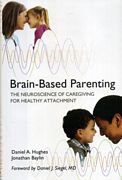
|
Brain-Based Parenting: the
Neuroscience of Caregiving for Healthy Attachment. Daniel
Hughes & Jonathan Baylin, $37.95
In this groundbreaking exploration of
the brain mechanisms behind healthy caregiving, attachment specialist Daniel
Hughes and veteran clinical psychologist Jonathan Baylin guide readers through
the intricate web of neuronal processes, hormones, and chemicals that drive — and
sometimes thwart — our caregiving impulses, uncovering the mysteries of the
parental brain.
The biggest challenge to parents, Hughes and Baylin explain, is learning how to
regulate emotions that arise — feeling them deeply and honestly while staying
grounded and aware enough to preserve the parent–child relationship. Learning
to be a "good parent" is contingent upon learning how to manage stress,
understand its brain-based cues, and respond in a way that will set the brain
back on track. With this awareness, we learn how to approach kids with renewed
playfulness, acceptance, curiosity, and empathy, re-regulate our caregiving
systems, foster deeper social engagement, and facilitate our children's
development.
Infused with clinical insight, illuminating case examples, and helpful
illustrations, Brain-Based Parenting brings the science of caregiving
to light for the first time. Far from just managing our children's behavior, we
can develop our "parenting brains," and with a better understanding of the
neurobiological roots of our feelings and our own attachment histories, we can
transform a fraught parent-child relationship into an open, regulated, and
loving one. |
Back to top
|
|
Building the Bonds of Attachment: Awakening Love in
Deeply Troubled Children, 3rd Edition. Daniel Hughes, $55.50
A highly accessible resource for students and
professionals as well as parents, Building the Bonds of Attachment presents a composite case study of one child’s developmental course following
years of abuse and neglect. Weaving theory and research into a powerful
narrative, Hughes offers effective methods for facilitating attachment in
children who have experienced serious trauma. The text emphasizes both the
specialized psychotherapy and parenting strategies often necessary in
facilitating a child's psychological development and attachment security.
Hughes steps through an integrated intervention model that blends attachment
and trauma theories with the most current research as well as general
principles of both parenting and child and family therapy. Thoughtful and
practical, the third edition provides an invaluable guide for therapists and
social workers, students in training, and parents.
Updates to the Third Edition include:
- Coverage of the greater preparation given to both the therapist
and parent before the onset of the treatment and placement based on our
understanding of how the attachment histories of both the parents and
therapists impact their engagement with the child
- Introduction of the concept of blocked care to better understand
the challenges of raising a traumatized child with attachment difficulties
- Introduction of the classification of developmental trauma that
is now commonly used to describe the challenges faced by children such as Katie
- Expanded coverage of intersubjectivity with demonstrations
throughout the book as to its impact on the development of the child
- Stronger development of the therapeutic and parenting stance of
PACE (playful, accepting, curious, empathic) since this has become a strong
organizing principle for training both therapists and parents using the dyadic
developmental psychotherapy (DDP) model
- Updated examples of the components of DDP (affective-reflective
dialogue, follow-lead-follow, interactive repair, deepening the narrative) and
a discussion of the ties between DDP and new research in interpersonal
neurobiology
|
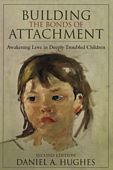
|
Building
the Bonds of Attachment: a DVD Presentation with Daniel
Hughes. $53.95 
Produced from a recent workshop given
by Dan Hughes on his Dyadic Developmental Psychotherapy model, this
DVD is for parents and professionals who live and work with adopted,
foster or biological children who have trauma-attachment disorders.
185 minutes.
Also available: Building the
Bonds of Attachment: an Audio CD Presentation. Daniel Hughes,
$20.00 |
Back to top
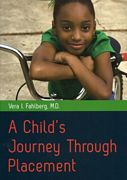
|
A Child’s Journey Through
Placement. Vera Fahlberg, $33.95
Children who are cared for in an out-of-home
placement are in need of support and stability. This classic text offers
information and advice for professionals and carers on how to help these
children, who will often have attachment difficulties.
Vera Fahlberg shares her experience and
expertise, outlining the significance of attachment and separation, the
developmental stages specific to adoptive children and providing guidance on
minimizing the trauma of moves. The book also features practical advice on case
planning, managing behavior and direct work with children, and throughout are
case studies and exercises which provide opportunities for further learning.
A readable, compassionate and practical
text, A Child’s Journey Through
Placement provides the foundation, the
resources, and the tools to help students, professionals, parents and others
who care to support children on their journey through placement to adulthood. |
|
The Circle of Security Intervention:
Enhancing Attachment in Early Parent-Child Relationships. Bert Powell, Glen Cooper, Kent Hoffman & Bob Marvin, $42.50
Presenting both a theoretical foundation
and proven strategies for helping caregivers become more attuned and responsive
to their young children's emotional needs (ages 0–5), this is the first
comprehensive presentation of the Circle of Security (COS) intervention. The
book lucidly explains the conceptual underpinnings of COS and demonstrates the
innovative attachment-based assessment and intervention strategies in rich
clinical detail, including three chapter-length case examples. COS is an
effective research-based program that has been implemented throughout the world
with children and parents experiencing attachment difficulties. |
Back to top
|
Connecting with Kids through Stories:
Using Narratives to Facilitate Attachment in Adopted Children, 2nd Edition. Denise Lacher, Todd Nichols & Joanne
May, $30.95
Children whose early development has
been damaged by abuse or neglect are notoriously difficult to
reach. Connecting with Kids through Stories is an accessible guide to
Family Attachment Narrative Therapy for the parents of adopted or fostered
children, and for the professionals who work with them. Providing a thorough
theoretical grounding, and detailed information on therapeutic techniques and
how to assess progress, the book shows parents how to create their own
therapeutic stories to promote increased attachment and improved behavior in
their child. The authors describe how different kinds of narratives can help
with specific difficulties and illustrate their techniques with the story of a
fictional family who develop their own narratives to help their adopted child
heal. |
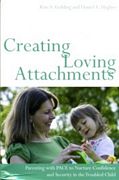
|
Creating Loving Attachments:
Parenting with PACE to Nurture Confidence and Security in the Troubled
Child. Daniel Hughes & Kim Golding, $29.95
All children need love, but for troubled
children, a loving home is not always enough. Children who have experienced
trauma need to be parented in a special way that helps them feel safe and
secure, builds attachments and allows them to heal.
Playfulness, acceptance, curiosity and
empathy (PACE) are four valuable elements of parenting that, combined with
love, can help children to feel confident and secure. This book shows why these
elements are so important to a child's development, and demonstrates to parents
and carers how they can incorporate them into their day-to-day parenting. Real
life examples and typical dialogues between parents and children illustrate how
this can be done in everyday life, and simple stories highlight the ideas
behind each element of PACE.
This positive book will help parents and
carers understand how parenting with love and PACE is invaluable to a child's
development, and will guide them through using this parenting attitude to help
their child feel happy, confident and secure. |
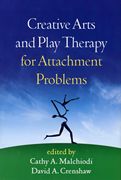
|
Creative Arts and Play Therapy for Attachments
Problems. Cathy Malchiodi & David Crenshaw, $47.50
This book vividly shows how creative arts and play
therapy can help children recover from experiences of disrupted or insecure
attachment. Leading practitioners explore the impact of early relationship
difficulties on children's emotions and behavior. Rich case material brings to
life a range of therapeutic approaches that utilize art, music, movement,
drama, creative writing, and play. The volume covers ways to address attachment
issues with individuals of different ages, as well as their caregivers.
Chapters clearly explain the various techniques and present applications for
specific populations, including complex trauma survivors. |
Back to top
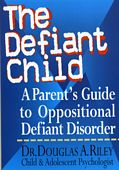
|
The Defiant Child:
a Parent’s Guide to Oppositional Defiant Disorder. Douglas
Riley, $18.95
The Defiant Child guides readers through the difficulties of raising a child or teenager who is attempting to ignore or defeat them at every turn. While it explains how defiant children and teens think, delving deeply into the mistaken ideas that lead them to believe that it is safe to ignore parents and challenge their authority, its chief purpose is to provide parents with a step-by-step plan to regain peace and harmony in the family. |
|
Developing Attachment in Early Years Settings:
Nurturing Secure Relationships from Birth to Five Years. Veronica Read,
$48.50
Providing an accessible introduction to attachment
thinking, this practical book offers early years practitioners' advice on
translating attachment principles into practice in their settings. It clearly
explains how knowledge about attachment theory underpins everyday practice and
highlights the crucial role of secure attachments in young children's learning
and development. Developing Attachments in Early Years Settings examines
the importance of emotional' 'holding' and the nurturing of individual
relationships within group childcare. The book aims to help you make a real
difference to young children's sense of self and emotional security by being 'tuned
in', available, responsive and consistent. |
|
Developing
Attachment: Family Therapy Examples Part 1 – Adolescents.
Daniel Hughes, $99.95
Developing Attachment: Family Therapy
Examples Part 2 – Children. Daniel Hughes, $99.95
Developing Attachment: Family Therapy
Examples Part 3 – Parents. Daniel Hughes, $99.95
Developing Attachment: Family Therapy Examples
3 DVD Set. Daniel Hughes, $259.95
Developing Attachment: Family Therapy
Examples is a three-part DVD series presenting the attachment-focused
treatment model developed by Dr. Daniel Hughes. Part
1 introduces attachment and inter-subjectivity that guides
Dr. Hughes' model of treatment, and demonstrates this model
in two therapy sessions with adolescents and their parents. Volume
2 looks at therapy with children and their parents and volume
3 focuses on therapy with the parents alone.
See also:
- Attachment-Focused Family
Therapy. Daniel Hughes.
- Attachment-Focused Parenting:
Effective Strategies to Care for Children. Daniel Hughes.
- Building the Bonds of Attachment:
a DVD Presentation with Daniel Hughes.
- Facilitating Developmental
Attachment: the Road to Emotional Recovery and Behavioral Change
in Foster and Adopted Children. Daniel Hughes.
|
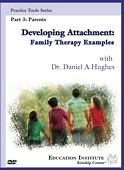
|
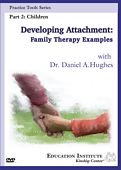
|
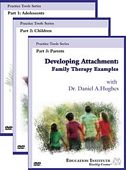
|
Back to top
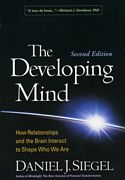
|
The Developing Mind: How
Relationships and the Brain Interact to Shape Who We Are, 2nd Edition. Daniel Siegel, $54.50
This bestselling book put the field of
interpersonal neurobiology on the map for many tens of thousands of readers.
Daniel Siegel goes beyond the nature and nurture divisions that traditionally
have constrained much of our thinking about development, exploring the role of
interpersonal experiences in forging key connections in the brain. He presents
a groundbreaking integrative framework for understanding the emergence of the
growing, feeling, communicating mind. Illuminating how and why interpersonal
neurobiology matters, this book is essential reading for clinicians, educators,
researchers, and students interested in promoting healthy development and
resilience across the lifespan. New to this edition:
- Incorporates significant scientific and
technical advances
- Expanded discussions of cutting-edge topics,
including neuroplasticity, epigenetics, mindfulness, and the neural correlates
of consciousness
- Epilogue on domains of integration — specific
pathways to well-being and therapeutic change
- Useful pedagogical features, such as diagrams
and an extensive glossary
|
|
Difficult Students and Disruptive Behavior in the
Classroom: Teacher Responses That Work. Vance Austin & Daniel Sciarra,
$39.95
Difficult Students and Disruptive Behavior in the Classroom provides skills-based interventions for educators to address the most common
problem behaviors encountered in the classroom. Offering not just
problem-specific “best practices” but an attachment-based foundation of sound
pedagogical principles and strategies for reaching and teaching disruptive,
difficult, and emotionally challenged students, it empowers educators to act
wisely when problem behaviors occur, improve their relationships with students,
and teach with greater success and confidence. |
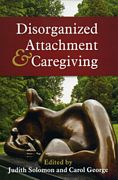
|
Disorganized Attachment
and Caregiving. Edited by Judith Solomon & Carol George,
$62.95
In this volume, leading authorities provide a state-of-the-art examination of disorganized attachment: what it is, how it can be identified, and its links to behavioral problems and psychological difficulties in childhood and beyond. The editors offer a fresh perspective on disorganized attachment, not as a characteristic of the infant or child but as the product of a dysregulated and disorganized parent-child relationship. They present cutting-edge research and exemplary treatment approaches. With attention to the subjective experiences of both mothers and children, the book shows how focusing on the caregiving system can advance research and clinical practice. |
Back to top
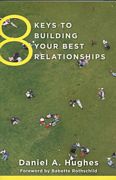
|
8 Keys to Building Your Best
Relationships. Daniel Hughes, $21.00
A revolution is under way in how we
understand the nature of relationships, how we develop in those relationships,
and how our brains function synergistically in connection with others. This
field is known as attachment theory, and veteran therapist and specialist in
attachment disorders Daniel Hughes demystifies the research in this practical
guide.
By summarizing in short, easy-to-read
“keys” the theory and brain science that underpin our ability to form
relationships, he skillfully reveals how we can become better friends, spouses,
siblings, and children. For anyone interested in how to develop meaningful new
relationships or how to deepen and enrich their current ones, this book makes
sense of it all. |
|
Empathic Care for Children with
Disorganized Attachments: a Model for Mentalizing, Attachment and
Trauma-Informed Care. Chris Taylor, $33.95
Disorganized attachment is the most
extreme form of insecure attachment. Synthesizing attachment, trauma and
mentalization theory into a useful practice model, Empathic Care for Children with
Disorganized Attachments proposes ways of meeting the needs arising in
children and young people with disorganized attachments. Focusing on the
importance of interpersonal bonds to facilitate the child's capacity to
mentalize, it aims to equip the reader with the appropriate skills to provide
effective, sustained and, most importantly, empathic care to the most
vulnerable and troubled children. This useful guide will be invaluable to
health and social care professionals including residential carers, therapists,
counsellors, and those working with vulnerable and troubled children and young
people including those supporting foster and adoptive families. |
Back to top
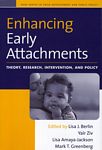
|
Enhancing Early Attachments:
Theory, Research, Intervention and Policy. Edited by Lisa Berlin,
Yair Ziv, Lisa Amaya-Jackson & Mark Greenberg, $44.50
Synthesizing the latest theory, research,
and practices related to supporting early attachments, this volume
provides a unique window into the major treatment and prevention
approaches available today. Chapters address the theoretical and
empirical bases of attachment interventions; explore the effects
of attachment-related trauma and how they can be ameliorated; and
describe a range of exemplary programs operating at the individual,
family, and community levels. Also discussed are policy implications,
including how programs to enhance early child-caregiver relationships
fit into broader health, social service, and early education systems.
|
|
|
Everyday Parenting with Security and Love: Using PACE
to Provide Foundations for Attachment. Kim Golding, $33.95
Children who have experienced trauma, loss or separation
early in life need more than just special care and attention; they need to be
parented with love and security in a way that allows them to heal and rebuild
emotional bonds. This comprehensive book provides parents and carers with
crucial advice and guidance on how to strengthen attachment and trust.
Based on Dan Hughes' proven 'PACE' model of therapeutic
parenting, this book explains how to implement PACE techniques to overcome the
challenges faced by children who struggle to connect emotionally. Barriers to
stable relationships such as a lack of trust, fear of emotional intimacy, and
high levels of shame are all explained. It explores techniques to overcome
these barriers by teaching how to support the child's behaviour at the same
time as building empathy and trust.
The practical parenting guidance offered throughout is
essential for carers or parents of troubled children, and will help build safe,
secure emotional relationships. |
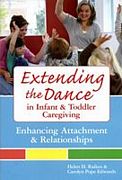
|
Extending the
Dance in Infant & Toddler Caregiving: Enhancing Attachment &
Early Relationships. Helen Raikes & Carolyn Pope
Edwards, $32.95
An in-depth blueprint for promoting attachment and relationships in early childhood settings, this book helps professional caregivers and educators develop sensitive, nurturing relationships with young children. In the process, they'll strengthen parent–child attachment and the supportive relationships among the adults who nurture the children. |

|
Facilitating Developmental
Attachment: the Road to Emotional Recovery and Behavioral Change
in Foster and Adopted Children. Daniel Hughes, $54.50
Therapists struggling to help attachment-disordered
children will find countless new insights and concrete examples
of how to be successful instead of frustrated in their work. Includes
theoretical principles, actual techniques employed in therapy, illustrative
case vignettes and a discussion of how to educate, assist and support
the parents of poorly attached children. |
Back to top

|
A
Forever Family: a True Story of Adoption. John Houghton,
$29.00
John Houghton and his wife — middle class,
highly educated, well-traveled — learned that they could not have
children of their own. Instead they adopted three siblings, two
boys and a girl, who were looking for 'a forever family', as the
adoption agencies put it. What followed is all too common in adoptive
families, but it is rarely talked about in public and has never
been described with such transparent honesty as it is in the pages
of this remarkable book … This is a story of desperate wanting,
of anger and frustrated love. It is written with a kind of plain
clarity that is both restrained and emotionally powerful. There
is no triumphant victory over pain and loss, but there is, in the
end, something like hope — a testament to the difference that two
decent people can make by sustaining their commitment to an impossible
situation. |
|
Foundations for Attachment Training Resource: the
Six-Session Programme for Parents of Traumatized Children. Kim Golding, $89.95
Foundations for Attachment Training Resource is
a 6-session training programme for professionals running parenting groups with
adoptive parents, foster carers and kinship carers. Featuring online resources
with downloadable handouts and exercises, it provides guidance on how to begin
to nurture attachments. It is designed specifically for those caring for
children whose capacity to emotionally connect has been compromised as a result
of attachment problems, trauma, and loss or separation.
Informed by attachment theory and Dyadic Developmental
Psychotherapy (DDP), it includes relevant theory and process notes for
trainers, and a range of activities supported by electronic resources with
downloadable activity sheets and handouts. This is a complete resource
containing everything you need to run the sessions, and is perfect for any
professionals involved in training foster carers, adoptive parents and kinship
carers. |
|
From Fear to Love: Parenting Difficult Adopted Children. B. Bryan Post, $17.50
Bryan Post speaks to parents about the challenges they face when dealing with behaviors that are often present for adopted children. He helps parents understand the impact of early life trauma and the impact of interruptions in the attachment process. In his compassion for parents and children, he offers hope and solutions for the challenges families face. |
|
|
Games and Activities for Attaching with Your Child.
Deborah Gray & Megan Clarke, $22.95
Packed full of great ideas for fun games and activities,
this book encourages positive attachments between a parent or carer and their
child.
When it comes to choosing the best games to play with children who have
difficulties attaching, it is often hard to know how to play with a purpose.
This book contains fun, age-appropriate games along with an explanation of why
they matter. All the games included are designed for specific age ranges, from
infants to older children, and help to address particular needs in children
that are known to affect attachment, including fetal alcohol spectrum disorder.
It provides an easy-to-understand description of attachment and reveals the
crucial role that play has in forming attachments.
Written for parents and carers, as well as for use by professionals, it is full
of strategies to help build healthy attachments in children who have
experienced early trauma. |
Back to top
|
The Girl Behind the Door: a Father's Quest to
Understand His Daughter's Suicide. John Brooks, $33.00
Early one Tuesday morning John Brooks went to his teenage
daughter’s room to make sure she was getting up for school and found her room
dark and “neater than usual.” Casey was gone but he found a note: The
car is parked at the Golden Gate Bridge. I’m sorry. Several hours later a
security video was found that showed Casey stepping off the bridge.
Brooks spent months after Casey’s suicide trying to understand what led his 17-year-old
daughter to take her life. He examines Casey’s journey from her abandonment at
birth in Poland, to the orphanage where she lived for the first fourteen months
of her life, to her adoption and life with John and his wife Erika in Northern
California. He reads. He talks to Casey’s friends, teachers, doctors,
therapists, and other parents. He consults adoption experts, researchers,
clinicians, attachment therapists, and social workers.
In The Girl Behind the Door, Brooks shares what he learned and asks
“What did everyone miss? What could have been done differently?” He’d come to
realize that Casey might have been helped if someone had recognized that she’d
likely suffered an attachment disorder from her infancy — an affliction common
among children who’ve been orphaned, neglected, and abused. This emotional
deprivation in early childhood, from the lack of a secure attachment to a
primary caregiver, can lead to a wide range of serious behavioral issues later
in life. John’s hope is that Casey’s story, and what he discovered since her
death, will help others. This important book is a wakeup call that parents,
mental health professionals, and teens should read. |
|
|
A Guide to Therapeutic Child Care: What You Need to
Know to Create a Healing Home. Ruth Emond, Laura Steckley & Autumn
Roesch-Marsh, $31.95
A Guide to Therapeutic Child Care provides an easy
to read explanation of the secrets that lie behind good quality therapeutic
child care. It describes relevant theories, the 'invisible' psychological
challenges that children will often struggle with and how to develop a
nurturing relationship and build trust. Combining advice with practical
strategies, the book also provides specific guidance on how to create safe
spaces (both physical and relational) and how to aid the development of key
social or emotional skills for children which may be lacking as a result of
early trauma.
Written with input from foster carers, the book is an
ideal guide for residential child care workers, foster carers, kinship carers,
social workers and new adoptive parents. |
|
|
Handbook of Attachment: Theory, Research, and Clinical
Applications, 3rd Edition. Edited by Jude Cassidy & Phillip Shaver,
$63.95
Widely regarded as the state-of-the-science reference on
attachment, this handbook interweaves theory and cutting-edge research with
clinical applications. Leading researchers examine the origins and development
of attachment theory; present biological and evolutionary perspectives; and
explore the role of attachment processes in relationships, including both
parent-child and adult romantic bonds. Implications for mental health and
psychotherapy are addressed, with reviews of exemplary attachment-oriented
interventions for children and adolescents, adults, couples, and families.
Contributors discuss best practices in assessment and critically evaluate
available instruments and protocols. New to This Edition:
- Chapters on genetics and epigenetics, psychoneuroimmunology, and
sexual mating
- Chapters on compassion, school readiness, and the caregiving
system across the lifespan
- Chapter probing the relation between attachment and other
developmental influences
- Nearly a decade's worth of theoretical and empirical advances
|
Back to top
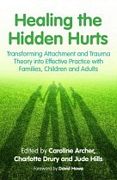
|
Healing the Hidden Hurts: Transforming Attachment and
Trauma Theory into Effective Practice with Families, Children, and Adults. Edited
by Caroline Archer, Charlotte Drury & Jude Hills, $35.95
With contributions from social workers, adoptive parents,
adoptees, psychologists, therapists, counsellors and other related
professionals, this book provides a varied and expansive approach to explaining
attachment theory. The authors speak from personal experience to deliver
explanations of theory, how they relate to practice and to provide practical
guidance on how to improve the physical, emotional and psychological
development of children in care across a broad range of professional
settings.
This book provides valuable insights relevant to practitioners within the
fields of social work, health, education, the criminal justice system and any
independent and voluntary sectors working with children and families. |
|
Healing Parents:
Helping Wounded Children Learn to Trust & Love. Michael
Orlans & Terry Levy, $41.95
Attachment is the deep connection that
children and parents/caregivers establish early in life. This connection
is basic to every aspect of a child’s emotional, social and cognitive
development. Healing Parents is a toolbox filled with practical
strategies and research that help parents and caregivers understand
their child, learn to respond in a constructive way, and create
a healthy environment. Readers will learn to develop their child’s
positive beliefs and establish trust by emphasizing respect, providing
appropriate limits, consistent structure, and being a positive role
model.
Michael Orlans and Terry Levy, authors
of the best-selling Attachment, Trauma and Healing (1998),
have created a guide designed to provide the information, tools,
support, self-awareness and hope needed to help a wounded child
heal emotional wounds and improve behaviorally, socially, and morally.
|
|
The Healing Power of
Emotion: Affective Neuroscience, Development & Clinical Practice.
Edited by Diana Fosha, Daniel & Marion Solomon, $43.50
Normal human development relies on the cultivation of relationships
with others to form and nurture the self-regulatory circuits that
enable emotion to enrich, rather than enslave, our lives. And
just as emotionally traumatic events can tear apart the fabric
of family and psyche, the emotions can become powerful catalysts
for the transformations that are at the heart of the healing process.
In this book, leading neuroscientists, developmental psychologists,
therapy researchers, and clinicians illuminate how to regulate
emotion in a healthy way. A variety of emotions, both positive
and negative, are examined in detail, drawing on both research
and clinical observations. The role of emotion in bodily regulation,
dyadic connection, marital communication, play, well-being, health,
creativity, and social engagement is explored. The Healing
Power of Emotion offers fresh, exciting, original, and groundbreaking
work from the leading figures studying and working with emotion
today. |
Back to top
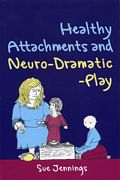
|
Healthy Attachments and Neuro-Dramatic-Play. Sue Jennings, $33.95
Breaking new ground in the areas of attachment and child development, Sue Jennings introduces the concept of “Neuro-Dramatic-Play” exploring the sensory experiences that take place between mother and child during pregnancy and the first few months after birth. She explains how this interaction, that is essentially 'dramatic' in nature, is of crucial importance for the infant to develop a healthy brain, strong attachments and future resilience.
This book consolidates current theories of neuroscience, attachment and therapeutic intervention and challenges commonly held psychoanalytic ideas of child development. By expanding on the often narrow view of what is understood by attachment, this book makes a strong case for early inclusion of play and arts therapies. Neuro-Dramatic-Play is also discussed in relation to fostering and adoption, teenagers and young adults, and children with developmental or cognitive disabilities. |
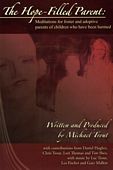
|
The Hope-Filled Parent: Meditations for Foster and Adoptive Parents of Children Who Have Been Harmed. Michael Trout, $20.95 CD format
This series of meditations is designed to help foster and adoptive parents maintain calm, focus and strength during the most challenging moments of life with a challenging child. |
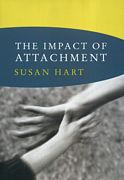
|
The Impact of Attachment. Susan Hart, $53.00
Combining theories of neurobiology, interpersonal relationships, and intra-psychic concepts, this significant book explores the importance of attachment. Hart addresses children's normal development and relational disorders and presents a unified and integrated therapeutic approach that takes attachment issues into consideration. |
Back to top
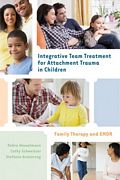
|
Integrative Team Treatment for Attachment Trauma in
Children: Family Therapy and EMDR. Debra Wesselmann, Cathy Schweitzer &
Stefanie Armstrong, $38.95
Loss of a parent, separations, abuse, neglect, or a
history of a difficult foster or orphanage experience can lead to profound
emotional dysregulation and mistrust in children. Working with these
children — many of whom have experienced multiple traumas and losses — can feel
overwhelming. Clinicians must navigate complex case management decisions and
referrals, address the needs of parents and schools, not to mention ameliorate
the traumatic memories and severe behaviors that present in the kids.
By working as a collaborative team, EMDR and family therapists can, together,
strengthen the parent-child attachment bond and help to mend the early
experiences that drive the child’s behavior. This book, and its accompanying
Parent Manual, are intended to serve as clear and practical treatment guides,
presenting the philosophy and step-by-step protocols behind the Integrative
Team Treatment approach, so both the family system issues and the child’s
traumatic past are effectively addressed. You need not be a center specializing
in attachment trauma to implement this team model, nor must members of the team
practice at the same location. With at least one fully-trained EMDR
practitioners as part of the two-person team, any clinician can pair with
another to implement this treatment approach, and heal children suffering from
attachment trauma.
Also available:
Integrative Parenting: Strategies for Raising Children
Affected by Attachment Trauma. Debra Wesselmann, Cathy Schweitzer &
Stefanie Armstrong, $25.95
Designed as a manual to complement the clinician’s guide,
this book is written for birth, foster, or adoptive parents, aunts and uncles,
grandparents, or anyone who may be raising a child who has experienced
attachment loss and trauma. Their severe behaviors can often leave caregivers
feeling confused, frightened, hurt, and overwhelmed, as they struggle to make
sense of a massive amount of information — and misinformation — that exists on
attachment issues. This book provides understanding, validation, and solutions
for these caregivers. In it, the authors explain their innovative model of
“team” treatment that includes an EMDR therapist and a family therapist. Best
used in conjunction with therapeutic help, it walks readers through an array of
parenting strategies that will lead them to a deeper understanding of their
traumatized child, and better enable them to calm their behavior and improve
their attachment security so they can heal. |
|
|
Love, Fear, and Health: How Our Attachments to Others
Shape Health and Health Care. Robert Mauner & Jonathan Hunter, $30.95
Can the way in which we relate to others seriously affect
our health? Can understanding those attachments help health care providers
treat us better? In Love, Fear, and Health, psychiatrists Robert
Maunder and Jonathan Hunter draw on evidence from neuroscience, stress
physiology, social psychology, and evolutionary biology to explain how
understanding attachment — the ways in which people seek security in their
close relationships – can transform patient outcomes.
Using attachment theory, Maunder and Hunter provide a
practical, clinically focused introduction to the influence of attachment
styles on an individual’s risk of disease and the effectiveness of their
interactions with health care providers. Drawing on more than fifty years of combined
experience as health care providers, teachers, and researchers, they explain in
clear language how health care workers in all disciplines can use this
knowledge to meet their patients’ needs better and to improve their health. |
Back to top
|
More than
Love: Adopting and Surviving Attachment Disordered Children. Sherril
Stone, $24.95 More than Love
is the candid and heartbreaking account of the adoption, parenting
and eventual relinquishment of three attachment-disordered brothers.
The book is an emotional tale of perseverance and helplessness,
joy and despair that vividly describes the parents' frustration
with the system meant to support them and their efforts to build
the support they needed with the help of therapists, psychologists,
clergy, teachers, social workers, friends and family. |
|
|
The Neurobiology of Attachment-Focused Therapy:
Enhancing Connection & Trust in the Treatment of Children & Adolescents. Jonathan Baylin & Daniel Hughes, $38.95
This groundbreaking book explores, for the first time,
how the attachment-focused family therapy model can respond to this question at
a neural level. It is a rich, accessible investigation of the brain science of
early childhood and developmental trauma. Each chapter offers clinicians new
insights — and powerful new methods — to help neglected and insecurely attached
children regain a sense of safety and security with caring adults. Throughout,
vibrant clinical vignettes drawn from the authors' own experience illustrate
how informed clinical processes can promote positive change. |
|
The Neuroscience of Human Relationships: Attachment
and the Developing Brain. Louis Cozolino, $50.50
As human beings, we cherish our individuality yet we know
that we live in constant relationship to others, and that other people play a
significant part in regulating our emotional and social behavior. Although this
interdependence is a reality of our existence, we are just beginning to
understand that we have evolved as social creatures with interwoven brains and
biologies. The human brain itself is a social organ and to truly understand
being human, we must understand not only how we as whole people exist with
others, but how our brains, themselves, exist in relationship to other brains.
Technical
advances now provide more windows into our inner neural universe and terms like
attachment, empathy, compassion, and mindfulness have begun to appear in the
scientific literature. Overall, there has been a deepening appreciation for the
essential interdependence of brain and mind. More and more parents, teachers,
and therapists are asking how brains develop, grow, connect, learn, and heal.
The new edition of this book organizes this cutting-edge, abundant research and
presents its compelling insights, reflecting a host of significant developments
in social neuroscience.
The Neuroscience of Human Relationships gives readers a deeper appreciation of
how and why relationships have the power to reshape our brains throughout our
life. |
|
New Families,
Old Scripts: a Guide to the Language of Trauma and Attachment in Adoptive
Families. Caroline Archer & Caroline Gordon, $33.95
Most adopted children and their families will, sooner or later,
encounter the challenges of dealing with unresolved attachment issues
or early traumatic experiences. New Families, Old Scripts is an accessible introduction to understanding these challenges
and helping children and their families to develop a shared language
and understanding of one another … The accessible combination of
theoretical approaches and practical advice makes New Families,
Old Scripts an ideal resource for social workers and adoptive
or foster parents. |
Back to top
|
No Matter What: an Adoptive Family’s
Story of Hope, Love and Healing. Sally Donovan,
$19.95
This book tells the uplifting true story
of an ordinary couple who build an extraordinary family — describing Sally and
Rob Donovan's journey from a diagnosis of infertility to their decision to
adopt two children who suffered abuse in their early life. Writing with
incisive wit and honesty, Sally Donovan recounts the bewildering logistics of
adoption and, after Sally and Rob are joyfully matched with siblings Jaymee and
Harlee, how their joy is followed by shock as they discover disturbing details
of their children's past. Determined to heal their children, Sally and Rob
realize they will need to go 'beyond parenting' to give them with the help they
need. |
| |
A Non-Violent Resistance Approach with Children in Distress: a Guide for Parents and Professionals. Carmelite Avraham-Krehwinkel & David Aldridge, $33.95
Parents, teachers and other professionals often struggle to know how to deal with disruptive, abusive or aggressive behavior. This book addresses the urgent need for a realistic, practical and effective approach to dealing with severe disruptive behavior in children and adolescents.
Adapting the principles of non-violent resistance originally advocated by Mahatma Gandhi, the book provides de-escalation techniques which empower the adult and unburden the distressed child. The authors outline the theoretical basis upon which the approach was developed, and explain how and why it can be so effective. Case studies demonstrate how the approach can be used to reach more successful places with unhappy and disruptive children of different ages. A separate section for parents provides useful advice on how to take the theoretical material and use it to deal with problematic behavior in everyday life.
As effective as it is original, this approach will empower desperate parents and despairing caregivers by equipping them with hands-on tools to contain, counter and positively direct the aggression and opposition which they face from children in distress. |
|
Nurturing Adoptions: Creating
Resilience after Trauma and Neglect. Deborah Gray, $29.95
Adopted children who have suffered
trauma and neglect have structural brain change, as well as specific
developmental and emotional needs. They need particular care to build
attachment and overcome trauma.
This book provides professionals with
the knowledge and advice they need to help adoptive families build positive
relationships and help children heal. It explains how neglect, trauma and
prenatal exposure to drugs or alcohol affect brain and emotional development,
and explains how to recognize these effects and attachment issues in children.
It also provides ways to help children settle into new families and home and
school approaches that encourage children to flourish. The book also includes
practical resources such as checklists, questionnaires, assessments and tools
for professionals including social workers, child welfare workers and mental
health workers.
This book will be an invaluable resource
for professionals working with adoptive families and will support them in
nurturing positive family relationships and resilient, happy children. It is
ideal as a child welfare text or reference book and will also be of interest to
parents. |
Back to top
|
Nurturing Attachments:
Supporting Children who are Fostered or Adopted. Kim Golding,
$37.95
This valuable tool for parents and adoption
professionals presents an accessible overview of attachment theory
and a step-by-step approach to developing resilience and emotional
growth. |
|
Nurturing Attachments Training
Resource: Running Parenting Groups for Adoptive Parents and Foster or Kinship
Carers. Kim Golding, $158.95
Nurturing Attachments Training
Resource
is a complete group programme containing everything you need to run training
and support sessions for adoptive parents, as well as residential, foster, or
kinship carers. Based on attachment theory, this rich resource provides an
authoritative set of ideas for therapeutically parenting children along with
all the guidance you will need to implement the training.
The training resource includes
theoretical content and process notes for facilitators, and a range of
activities supported by a CD-ROM with photocopiable reflective diary sheets,
activity sheets and handouts. It is structured into 3 modules with 6 sessions
per module. Module 1: Provides an understanding of attachment theory, patterns
of attachment and an introduction to therapeutic parenting. Module 2:
Introduces the House Model of Parenting, providing guidance on how to help the
children experience the family as a secure base. Module 3: Continues exploring
the House Model of Parenting, with consideration of how parents can both build
a relationship with the children and manage their behaviour. |
Back to top
|
Nurturing Natures: Attachment and Children’s
Emotional, Sociocultural and Brain Development, 2nd Edition. Graham Music,
$76.90
This new edition of the bestselling text, Nurturing
Natures, provides an indispensable synthesis of the latest scientific
knowledge about children’s emotional development. Integrating a wealth of both
up-to-date and classical research from areas such as attachment theory,
neuroscience developmental psychology and cross-cultural studies, it weaves
these into an accessible enjoyable text which always keeps in mind children
recognisable to academics, practitioners and parents.
It unpacks the most significant influences on the
developing child, including the family and social context. It looks at key
developmental stages from life in the womb to the pre-school years and right up
until adolescence, covering important topics such as genes and environment,
trauma, neglect or resilience. It also examines how children develop language,
play and memory and, new to this edition, moral and prosocial capacities.
Issues of nature and nurture are addressed and the effects of different kinds
of early experiences are unpicked, creating a coherent and balanced view of the
developing child in context. |
|
Observing Adolescents with Attachment Difficulties in
Educational Settings: a Tool for Identifying and Supporting Emotional and
Social Difficulties in Young People Ages 11-16. Kim Golding, Mary Turner,
Helen Worrall, Jennifer Roberts & Ann Cadman, $40.95
An observational tool designed to help structure
observations of children 11+ with attachment issues in school. Simple
checklists and diagrams help to identify emotional and behavioural problems,
and hand-outs with activities are provided to provide emotional support and
identify appropriate interventions. Behavioural responses are categorised
within clearly outlined topics, including:
- behaviour and relationship with peers
- attachment behaviours
- emotional state in the classroom
- attitude to attendance
|
Back to top
|
Observing Children with Attachment
Difficulties in Preschool Settings: a Tool for Identifying and Supporting
Emotional and Social Difficulties. Kim Golding,
Jane Fain, Ann Frost, Sian Templeton & Eleanor Durrant, $39.95
For preschool children with emotional
difficulties arising from difficulties in attachment, standard observations
used in early years settings are not always helpful in identifying their
problems and providing guidance on how they can be helped.
Combining an accessible introduction to
attachment and child development with a child observation tool for identifying
behaviour, and the emotional needs underlying this behaviour, this book enables
ECE professionals to identify problems and provide appropriate support. 'Case
study' boxes help to illustrate typical patterns of attachment, and all aspects
of behaviour are covered including play, interaction with peers, neediness and
aggression. Suitable for use with children aged 2-5, this will be an invaluable
resource for early years professionals, as well as clinicians, teachers and
learning support staff. |
|
Observing Children with Attachment Difficulties in
School: a Tool for Identifying and Supporting Emotional and Social Difficulties
in Children Aged 5-11. Kim Golding, et al, $34.95
Emotional difficulties in children aged
5-11 can display themselves in a range of different behaviours, and it is
important for staff in schools to be able to identify and address these
problems, and to provide appropriate help.
This easy-to-use tool provides an
observation checklist which enables staff to identify behavioural patterns in
children with social and emotional difficulties, analyze the emotional
difficulties underlying these behaviours and establish what kind of help and
support the children need. Behavioural responses are categorized within clearly
outlined topics, including behaviour, play and relationship with peers,
attachment behaviours, emotional state in the classroom and attitude to attendance.
Checklists and diagrams identify different 'styles' of relating (secure,
avoidant, ambivalent), to help school staff who work with children and their
families to respond appropriately to the individual needs of each child. A
range of handouts include activities designed to provide emotional support, to
focus and regulate behaviour and enable the child to develop important social
and emotional skills. |
Back to top
|
1-2-3 Magic: Effective Discipline for Children 2 – 12,
6th Edition. Thomas Phelan, $22.50; DVD $55.95
This award-winning, bestselling book in a new edition is
now even easier to use with an updated internal design that is user-friendly
and has more visual interest. The 6th Edition is more engaging and browse-able
for the reader. We’ve also added a handy new index. The world's simplest and
most effective parenting program is all right here!
- Part I: Building a Solid Foundation for Parenting
- Part II: Controlling Obnoxious Behavior: Parenting Job 1
- Part III: Managing Testing and Manipulation
- Part IV: Encouraging Good Behavior: Parenting Job 2
- Part V: Strengthening Your Relationship with Your Children:
Parenting Job 3
- Part VI: Enjoying Your New Family Life
|
|
The Origins of Attachment: Infant
Research and Adult Treatment. Beatrice Beebe &
Frank Lachman, $53.95
The Origins of Attachment addresses the
origins of attachment in mother-infant face-to-face communication. Utilizing an
extraordinarily detailed microanalysis of videotaped mother-infant interactions
at 4 months, Beatrice Beebe, Frank Lachmann, and their research collaborators
provide a fine-grained and precise description of the process of attachment
transmission. Second-by-second microanalysis operates like a social microscope
and reveals more than can be grasped with the naked eye.
The book explores how, alongside
linguistic content, the bodily aspect of communication is an essential
component of the capacity to communicate and understand emotion. The
moment-to-moment self- and interactive processes of relatedness documented in
infant research form the bedrock of adult face-to-face communication and
provide the background fabric for the verbal narrative in the foreground.
The Origins of Attachment is
illustrated throughout with several case vignettes of adult treatment.
Discussions by Carolyn Clement, Malcolm Slavin and E. Joyce Klein, Estelle
Shane, Alexandra Harrison and Stephen Seligman show how the research can be
used by practicing clinicians. This book details aspects of bodily
communication between mothers and infants that will provide useful analogies
for therapists of adults. |
Back to top
|
Parenting the Hurt
Child: Helping Adoptive Families Heal and Grow. Gregory Keck
& Regina Kupecky, $21.50
The world is full of hurt children, and bringing one into your
home can quickly derail the easy family life you once knew. Get
effective suggestions, wisdom, and advice to parent the hurt child
in your life.
Parenting the Hurt Child explains how to manage a hurting
child with loving wisdom and resolve and how to preserve your stability
while untangling their thorny hearts. |
|
Personality
Disorders in Childhood and Adolescence. Arthur Freeman
& Mark Reinecke, Editors, $123.99
Personality traits are pervasive and
enduring patterns of the ways individuals perceive, relate to, think
about, and behave within their environment. When these traits become
inflexible and maladaptive they constitute personality disorders.
This edited volume explores the clinical reality of personality
disorders in the especially vulnerable population of children and
adolescents. |
|
|
Promoting Attachment with a Wiggle, Giggle, Hug and
Tickle: a Programme for Babies, Young Children and Carers. Fiona Brownlee
& Lindsay Norris, $29.95
Practical and easy to use, this resource is for
practitioners working in early years settings to help children aged 0-2 to
develop secure and positive attachments with their parent or carer.
Designed to be flexible for one-to-one or group work, the resource features fun
and engaging activities involving singing, movement and sensory activities in a
structured but playful environment. It explains the significance of positive
attachments in a child's early years, and equips practitioners with skills and
techniques to help encourage bonding. It will be of particular interest to
those working with parents needing additional support such as vulnerable and
adoptive or foster families. The resource is accompanied by online materials -
songs to sing along with, and film clips of signing to help parents and carers
improve communication. This programme will help parents to become more attuned
to the needs of their child, and aid the child's emotional, social and
cognitive development.
With additional guidance on how to run the programme as a group, this resource
will be easy to use for any health, education or childcare practitioner in
specialist and mainstream settings. |
Back to top
|
Promoting
Positive Parenting: an Attachment-Based Intervention. Edited
by Femmie Juffer, Marian Bakermans-Kranenburg & Marinus van
Ijzendoorn, $43.50
Video-feedback Intervention to Promote
Positive Parenting (VIPP) is a brief and focused parenting intervention
program that has been successful in a variety of clinical and non-clinical
groups and cultures. The book opens with an introduction to the
VIPP program and the theoretical background of this parenting intervention,
followed by a narrative and meta-analytical review of the attachment-based
interventions. The book continues with detailed descriptions and
case reports of several intervention studies of the program. It
describes the implementation and testing of a variety of VIPP based
interventions highlighting different families in a variety of childcare
settings, and in various countries including the Netherlands, Italy,
the United Kingdom, and the United States. |
|
Psychotherapy with Infants and Young
Children: Repairing the Effects of Stress and Trauma on Early Attachment. Alicia Lieberman & Patricia Van Horn, $50.50
This eloquent book presents an
empirically supported treatment that engages parents as the most powerful
agents of their young children's healthy development. Child-parent psychotherapy
promotes the child's emotional health and builds the parent's capacity to
nurture and protect, particularly when stress and trauma have disrupted the
quality of the parent-child relationship. The book provides a comprehensive
theoretical framework together with practical strategies for combining play,
developmental guidance, trauma-focused interventions, and concrete assistance
with problems of living. Filled with evocative, "how-to-do-it"
examples, it is grounded in extensive clinical experience and important
research on early development, attachment, neurobiology, and trauma. |
|
Raising a Secure Child: How Circle of Security
Parenting Can Help You Nurture Your Child's Attachment, Emotional Resilience,
and Freedom to Explore. Kent Hoffman, Glen Cooper & Bert Powell, $21.95
Today's parents are constantly pressured to be perfect.
But in striving to do everything right, we risk missing what children really
need for lifelong emotional security. Now the simple, powerful "Circle of
Security" parenting strategies that Kent Hoffman, Glen Cooper, and Bert
Powell have taught thousands of families are available in self-help form for
the first time. You will learn:
- How to balance nurturing and protectiveness with promoting your
child's independence
- What emotional needs a toddler or older child may be expressing
through difficult behavior
- How your own upbringing affects your parenting style — and what you
can do about it
Filled with vivid stories and unique practical tools,
this book puts the keys to healthy attachment within everyone's
reach — self-understanding, flexibility, and the willingness to make and learn
from mistakes. |
Back to top
|
|
Real Life Heroes Life Storybook, 3rd Edition.
Richard Kagan, $41.90
Real Life Heroes Life Storybook, 3rd Edition is a
resourceful tool for children with traumatic stress. The resiliency-centered
format and structure of the volume is coupled with treatment and sessions
outlined in the Real Life Heroes Toolkit for Treating Traumatic Stress in
Children and Families. This updated edition uses a creative arts approach,
encouraging children to work with dependable adults to develop autobiographies
through a wide range of activities, including drawings, music, movies, and
narrative. By helping children feel protection from adversity and stressors
that exist in everyday life, this workbook gives children a sense of value that
can promote transformation of troubled children from victims into tomorrow's
heroes. |
|
Real Life Heroes Toolkit for Treating Traumatic Stress
in Children and Families, 2nd Edition. Richard Kagan, $89.45
Real Life Heroes: Toolkit for Treating Traumatic
Stress in Children and Families, Second Edition is an organized and
easy-to-use reference for practitioners providing therapy to children and
caregivers with traumatic stress. This step-by-step guide is an accompanying
text to the workbook Real Life Heroes: A Life Story Book for Children, Third
Edition and provides professionals with structured tools for helping
children to reintegrate painful memories and to foster healing from traumatic
experiences. The book is a go-to resource for practitioners in child and family
service agencies and treatment centers to implement trauma-informed,
resiliency-centered and evidence-supported services for children with traumatic
stress. |
|
Reparenting the Child Who Hurts: a
Guide to Healing Developmental Trauma and Attachments. Caroline Archer & Christine Gordon, $31.95
Finally, a parenting book which
demystifies the latest thinking on neurobiology, physiology and trauma and
explains what the research means for the everyday life of parents of children
who hurt. As experts on adoption and fostering who are adoptive parents
themselves, Caroline Archer and Christine Gordon explain how this knowledge can
help parents to better understand and care for their child. They explain why
conventional parenting techniques are often not helpful for the child who has
experienced early trauma and explore why therapeutic reparenting is
the only way to help repair the unhealthy neurobiological and behavioural
patterns which affect the child's development. They do not shy away from how
difficult reparenting is, acknowledging how hard it can be to recognize our own
fallibility as parents and to change our own parenting patterns. The authors
also offer hard-won advice on a range of common parenting flashpoints — from
defusing arguments and aggression to negotiating bedtimes and breaks in
routine, and making sure that special occasions are remembered for all the
right reasons.
Reparenting the Child Who Hurts is
a humane, no-nonsense survival guide for any parent caring for a child with
developmental trauma or attachment difficulties, and will also provide
information and insights for social workers, teachers, counsellors and other
professionals involved in supporting adoptive and foster families. |
Back to top
|
Romania’s Abandoned Children:
Deprivation, Brain Development, and the Struggle for Recovery. Charles Nelson, Nathan Fox & Charles Zeanah, $33.95
The implications of early experience for
children’s brain development, behavior, and psychological functioning have long
absorbed caregivers, researchers, and clinicians. The 1989 fall of Romania’s
Ceausescu regime left approximately 170,000 children in 700 overcrowded,
impoverished institutions across Romania, and prompted the most comprehensive
study to date on the effects of institutionalization on children’s
wellbeing. Romania’s Abandoned Children, the authoritative account of this
landmark study, documents the devastating toll paid by children who are
deprived of responsive care, social interaction, stimulation, and psychological
comfort.
Launched in 2000, the Bucharest Early
Intervention Project (BEIP) was a rigorously controlled investigation of foster
care as an alternative to institutionalization. Researchers included 136
abandoned infants and toddlers in the study and randomly assigned half of them
to foster care created specifically for the project. The other half stayed in
Romanian institutions, where conditions remained substandard. Over a
twelve-year span, both groups were assessed for physical growth, cognitive
functioning, brain development, and social behavior. Data from a third group of
children raised by their birth families were collected for comparison.
The study found that the
institutionalized children were severely impaired in IQ and manifested a
variety of social and emotional disorders, as well as changes in brain
development. However, the earlier an institutionalized child was placed into
foster care, the better the recovery. Combining scientific, historical, and
personal narratives in a gripping, often heartbreaking, account, Romania’s Abandoned Children highlights the urgency of efforts to help the millions
of parentless children living in institutions throughout the world. |
|
The Routledge Handbook of Attachment: Implications and
Interventions. Edited by Paul Holmes & Steve Farnfield, $53.50
This guide offers an introduction to therapies
produced as a result of the popularity of attachment studies. These therapies
can be divided into two categories: those that are ‘attachment-based’, in that
they use evidence-based attachment assessments in their development, or
‘attachment-informed’, in that the theories of attachment have been integrated
into the practice of existing schools of therapy.
The book reviews the field and provides a range of
interventions for children, adults and parents, beginning with a detailed
review of both evidence-base and evidence-informed interventions including
individual psychotherapy, family therapy and parenting. The remaining chapters
provide accounts, from the practitioner’s perspective, of interventions that
address issues of attachment from the level of one-to-one therapy, family and
social work to social interventions involving courts and Care Proceedings,
illustrated with examples from day-to-day practice. |
|
A Short Introduction to Attachment and Attachment Disorder,
2nd Edition. Colby Pearce, $25.95
Concise and easy-to-understand, this book provides an
introduction to what attachment means and how to recognise attachment disorder
in children. Colby Pearce explains how complex problems in childhood may stem
from the parent-child relationship during a child's early formative years, and
later from the child's engagement with the broader social world. The book
explores the mind-set of difficult and traumatised children and the motivations
behind their complex tendencies and behaviours. It goes on to offer a
comprehensive set of tried-and-tested practical strategies that can be used
with children affected by an attachment disorder. This second edition has been
updated to include the new DSM-5 diagnostic criteria for Reactive Attachment
Disorder and an increased number of illustrative case vignettes.
This is a perfect introduction to the subject for
parents, carers and practitioners in supportive roles caring for children. |
Back to top
|
Social Intelligence: the New Science
of Human Relationships. Daniel Goleman, $17.50
Far more than we are consciously aware,
our daily encounters with parents, spouses, bosses, and even strangers
shape our brains and affect cells throughout our bodies—down to
the level of our genes—for good or ill. In Social Intelligence,
Daniel Goleman explores an emerging new science with startling implications
for our interpersonal world. Its most fundamental discovery: we
are designed for sociability, constantly engaged in a “neural ballet”
that connects us brain to brain with those around us. Our reactions
to others, and theirs to us, have a far-reaching biological impact,
sending out cascades of hormones that regulate everything from our
hearts to our immune systems, making good relationships act like
vitamins — and bad relationships like poisons … Goleman explains the
surprising accuracy of first impressions, the basis of charisma
and emotional power, the complexity of sexual attraction, and how
we detect lies. He describes the “dark side” of social intelligence,
from narcissism to Machiavellianism and psychopathy. He also reveals
our astonishing capacity for “mindsight,” as well as the tragedy
of those, like autistic children, whose mindsight is impaired.
|
|
Steps
to Stability. The Kinship
Centre, $79.95
This DVD presents practical information
on helping children in the child welfare system transition
from one setting to another. Youth and families speak about
their personal experiences in achieving permanence and stability,
and experts in the field add tools and techniques for parents,
social workers, child advocates and mental health professionals.
The video is appropriate for a wide audience and is useful
as a training tool for professionals. |
Back to top
|
Success
as a Foster Parent: Everything You Need to Know About Foster
Care. National Foster
Care Association, with Rachel Greene Baldino, $21.00 (ages
6-10)
Success as a Foster Parent offers
you the information you need to get ready for this life-changing
experience. Discover what it takes to be a foster parent and
get real-life tips from other successful foster families. |
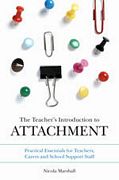
|
The Teacher's Introduction to Attachment: Practical
Essentials for Teachers, Carers and School Support Staff. Nicola Marshall,
$24.95
Simple and concise, The Teacher's Introduction to
Attachment offers an easy way to understand children with attachment issues
and how they can be supported.
Author Nicola Marshall combines her expertise as an
adoptive parent and schools-trainer to describe in plain English what
attachment is, how children develop attachment problems and how these problems
affect a child's social, emotional and neurological development. She addresses
some of the difficulties in identifying attachment issues in children — common
among children who are in care or adopted, but which are sometimes mistaken for
symptoms of ADHD or Autism Spectrum Disorder. Nicola also describes a range of
helpful principles and practical strategies which will help children flourish —
from simple tips for the individual on how to improve their communication to
the changes a school can make to reduce a child's anxiety about changes and
transitions.
Ideal for teachers and support staff to pick up and use,
this book is an essential addition to any school's staff library. |
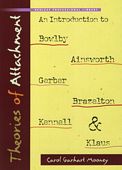
|
Theories of Attachment:
an Introduction to Bowlby, Ainsworth, Gerber, Brazelton, Kennell
& Klaus. Carol Garhart Mooney, $28.95
Theories of Attachment provides
a solid foundation for informed early childhood care and is
a terrific resource for anyone working with young children.
It thoroughly covers the background and research of the prominent
minds of attachment theorists John Bowlby, Mary Ainsworth,
Magda Gerber, John Kennell, Marshall Klaus, and T. Berry Brazelton
— including the theory keystones of bonding, separation,
and crying. |
Back to top
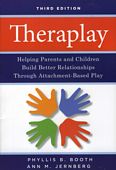
|
Theraplay: Helping
Parents and Children Build Better Relationships through Attachment-Based
Play, 3rd Edition. Phyllis Booth & Ann Jernberg, $72.00
Theraplay is a pioneering application of attachment theory
to clinical work that helps parents learn and practice how to
provide the playful engagement, empathic responsiveness, and
clear guidance that lead to secure attachment and lifelong mental
health in their children. This third edition of the groundbreaking
book Theraplay shows how to use play to engage children
in interactions that lead to competence, self-regulation, self-esteem,
and trust. |
|
Treating Attachment Disorders: from
Theory to Therapy, 2nd Edition. Karl
Heinz Brisch, $38.95
Organized around extended case
illustrations — and grounded in cutting-edge theory and research — this highly
regarded book shows how an attachment perspective can inform psychotherapeutic
practice with patients of all ages. Karl Heinz Brisch explores the links
between early experiences of separation, loss, and trauma and a range of
psychological, behavioral, and psychosomatic problems. He demonstrates the
basic techniques of attachment-based assessment and intervention, emphasizing
the healing power of the therapeutic relationship. With a primary focus on
treating infants and young children and their caregivers, the book discusses
applications of attachment-based psychotherapy over the entire life course. |
|
Treating Explosive
Kids: the Collaborative Problem-Solving Approach. Ross Greene
& J. Stuart Ablon, $57.95
The first comprehensive presentation
for clinicians of the groundbreaking approach popularized in Ross
Greene's acclaimed parenting guide, The Explosive Child,
this book provides a detailed framework for effective, individualized
intervention with highly oppositional children and their families.
Many vivid examples and Q&A sections show how to identify the
specific cognitive factors that contribute to explosive and noncompliant
behavior, remediate these factors, and teach children and their
adult caregivers how to solve problems collaboratively.
|
|
Treating Trauma in Adolescents: Development,
Attachment, and the Therapeutic Relationship. Martha Straus, $49.50
This book presents an innovative and empathic approach to
working with traumatized teens. It offers strategies for getting through to
high-risk adolescents and for building a strong attachment relationship that
can help get development back on track. Martha Straus draws on extensive
clinical experience as well as cutting-edge research on attachment, developmental
trauma, and interpersonal neurobiology. Vivid case material shows how to engage
challenging or reluctant clients, implement interventions that foster
self-regulation and an integrated sense of identity, and tap into both the
teen's and the therapist's moment-to-moment emotional experience. Essential
topics include ways to involve parents and other caregivers in treatment. |
Back to top
|
Unconditional Care: Relationship-Based, Behavioral Intervention with Vulnerable Children and Families. John Sprinson & Ken Berrick, $36.95
This clinician-friendly guide presents a model for engaging the most challenging children and families who are served by the child welfare, mental health, juvenile justice, and special educations systems. These children are among the most troubled clients that treatment providers will ever encounter. They have been failed by every adult, every treatment modality, and every system of care that they have encountered.
Unconditional Care, a breakthrough guide from the founder and clinical director of California's Seneca Center for Children and Families, offers both a theoretical model and practical guidelines for working with this most difficult group of children. The approach weaves together attachment theory and learning theory into a coherent relationship-based intervention strategy built around a no-fail policy: a child can never be discharged from a program for exhibiting the behaviors that resulted in the placement. The concept of unconditional care allows, for the first time, a safe space for youth to reconstruct their perceptions of themselves and those who care for them. |
|
Understanding
Attachment and Attachment Disorders: Theory, Evidence and Practice.
Vivien Prior & Danya Glaser, $35.95
This book offers a thorough examination
and discussion of the evidence on attachment, its influence on development,
and attachment disorders. Summarizing the existing knowledge
base in accessible language, this is a comprehensive reference book
for professionals including social workers, psychologists, psychiatrists,
teachers, lawyers and researchers. Foster and adoptive parents,
indeed all parents, and students will also find it of interest. |
|
Understanding
Attachment: Parenting, Child Care and Emotional Attachment.
Jean Mercer, $63.95
Understanding Attachment is perfect for the reader who
wants or needs a thorough understanding of attachment theory, but
does not have the time to indulge in lengthy study. Parents, child
care providers, teachers, nurses, social workers, attorneys, therapists,
students, and counselors will all appreciate this work. Mercer defines
attachment and related terms, discusses the history of the idea,
and describes ways in which this aspect of emotional life can be
measured. She explains developmental change and the way attachment
continues to alter from infancy to adulthood. The importance of
social experiences with parents and other caregivers is emphasized.
Outcomes of good and poor attachment experiences are discussed,
and there is material on attachment disorders. The book concludes
with a description of recent work that gives a new perspective on
attachment. |
Back to top

|
Understanding Disorganized Attachment: Theory and Practice for Working with Children and Adults. David Shemmings & Yvonne Shemmings, $35.95
Disorganized attachment, the most extreme form of insecure attachment, can develop in a child when the person who is normally meant to protect them is a source of danger. This usually leads to 'fear without solution' and the effects can be lasting and damaging.
This book is a comprehensive and accessible text on disorganized attachment. It outlines what it is, how it can be identified and the key causes, including neurological, biochemical and genetic explanations. Factors that contribute to disorganized attachment are covered including unresolved loss and trauma, and the behaviour of caregivers. The authors also discuss evidence-based interventions to help families and carers as well as how to work with adults to prevent or minimize its occurrence. To root the theory in practice and to illustrate real-life examples of disorganized attachment case vignettes are included. |
|
Understanding
and Meeting the Nine Most Important Emotional Needs of Foster and
Adopted Children. Bryan Post & Juli Alvarado, $25.95 DVD
40 minutes
By meeting these nine basic emotional needs you will see a reduction
in disrupted placements and an increase in families and children
feeling supported. The systems for children in care must have up
to date knowledge of the experiences of children the challenges
that these families face. This 40 minute educational DVD workshop
will help social workers in providing more effective support to
the families they work with. |
|
Understanding Transitions in the
Early Years: Supporting Change through Attachment and Resilience. Anne O’Connor, $38.50
There are many transitions that children
experience before they are five, including the first major transition from home
to an early years setting. Understanding Transitions in the
Early Years explains why transitions matter and provides practical guidance on
how to support young children’s developing emotional resilience and equip them
to embrace change in the future. Including case studies, examples of good
practice and questions for reflection this thought-provoking text emphasizes
the little things that practitioners can do for the individual children in
their care to help them feel secure and confident when dealing with change. |
Back to top
|
|
Weaving the Cradle: Facilitating Groups to Promote
Attunement and Bonding Between Parents, Their Babies and Toddlers. Edited
by Monika Celebi, $39.95 (pregnancy to age two)
Groups for parents, babies and toddlers, spanning the
1001 critical days from late pregnancy up to age two, are an effective way of
supporting expectant and new parents by helping them to become more attuned,
sensitive and empathic towards their child.
Contributors bring together a range of theoretical
perspectives to show different ways to facilitate groups that combine
mindfulness and psychological insight to promote bonding, attunement and
mind-mindedness, and to prevent abuse and neglect. Case examples show a range
of techniques that can be used, including baby massage, movement therapy, Video
Interaction Guidance, Watch Wait Wonder and psychotherapeutic interventions.
Examples include an in-patient mother-baby unit, community and health centres
in the UK, to international examples in Greece, Kenya and New Zealand. Chapters
illustrate practical and clinical aspects of running groups, the associated
challenges, and highlights the importance of professional collaboration in a
benign environment.
Weaving the Cradle is full of ideas and insights
for those already running groups, as well as for those considering it, across
health, social care and education settings. |
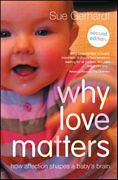
|
Why Love Matters: How Affection Shapes a Baby's Brain,
2nd Edition. Sue Gerhardt, $37.50
Why Love Matters explains why loving
relationships are essential to brain development in the early years, and how
these early interactions can have lasting consequences for future emotional and
physical health. This second edition follows on from the success of the first,
updating the scientific research, covering recent findings in genetics and the
mind/body connection, and including a new chapter highlighting our growing
understanding of the part also played by pregnancy. Sue Gerhardt focuses in
particular on the wide-ranging effects of early stress on a baby or toddler’s
developing nervous system. When things go wrong with relationships in early
life, the dependent child has to adapt; what we now know is that his or her
brain adapts too. The brain’s emotion and immune systems are particularly
affected by early stress and can become less effective. This makes the child
more vulnerable to a range of later difficulties such as depression,
anti-social behaviour, addictions or anorexia, as well as physical illness.
Why Love Matters is an accessible, lively,
account of the latest findings in neuroscience, developmental psychology and
neurobiology – research which matters to us all. It is an invaluable and hugely
popular guide for parents and professionals alike. |
|
Working
with Anger and Young People. Nick Luxmoore, $31.95
From attachment anxieties and feelings of powerlessness, to frustration
at difficult family relations, Nick Luxmoore considers the common
reasons for young people’s anger during this difficult stage of
their development. Through accounts of his work with a range of
young people, he offers tried-and-tested exercises and talking points
to help work through common counterproductive responses to anger
such as antisocial behaviour and physical or verbal violence. Crucially,
he also recognizes the needs of those working with these young people
with anger problems and provides advice on working safely, maintaining
control and achieving job satisfaction. |
|
Your Defiant Child: Eight Steps to
Better Behavior, 2nd Edition. Russell
Barkley & Christine Benton, $20.50
Restore your loving relationship with
your child, and bring peace to your home, with this proven program. |
Back to top
Complete
Booklist
Resources for
Casework Professionals & Therapists
Affect Regulation and the Development of Psychopathology.
Susan Bradley, $45.00
Attachment in Common Sense and
Doodles: a Practical Guide. Miriam Silver, $22.95
Attachment and Development. Susan Goldberg,
$66.95
Attachment Disorganization. Judith Solomon
& Carol George, $63.50
Attachment: Expanding the Cultural Connections. Edited by Phyllis Erdman & Kok-Mun Ng, $87.50
Attachment from Infancy to Adulthood: the Major
Longitudinal Studies. K. Grossman, et al, (eds) $32.50
Attachment in Middle Childhood. Kathryn Kerns
& Rhonda Richardson (eds), $45.95
Attachment in the Young Child. Kinship Center, $95.50 DVD
format
Attachment Issues in Psychopathology and Intervention.
Leslie Atkinson & Susan Goldberg (eds), $73.50
Attachment Parenting: Developing Connections and Healing
Children. Arthur Becker-Weidman & Deborah Shell, $67.95
Attachment Theory in Clinical Work with Children: Bridging
the Gap between Research and Practice. Edited by David Oppenheim &
Douglas Goldsmith, $27.50
Attachment Theory: Social, Developmental and
Clinical Perspectives. Sue Goldberg et al, (eds), $62.50
The Attachment Therapy Companion: Key Practices for Treating
Children & Families. Arthur Becker-Weidman, Lois Ehrmann & Denise
LeBow, $29.50
Attachment Therapy with Adolescents and Adults: Theory
and Practice Post Bowlby. Dorothy Heard, Brian Lake & Una McCluskey,
$39.95
Attachment, Trauma, and Healing: Understanding and
Treating Attachment Disorder in Children, Families, and Adults, 2nd Edition.
Terry Levy & Michael Orlans, $49.95
Attachment-Based Family Therapy for
Depressed Adolescents. Guy Diamond, Gary Diamond
& Suzanne Levy, $96.95
Attachment-Based Teaching: Creating a Tribal Classroom.
Louis Cozolino, $32.00
Attachment-Focused Family Therapy. Daniel Hughes, $39.00
Attachment-Focused Family Therapy Workbook. Daniel Hughes, $39.95
Attachment-Focused
Parenting: Effective Strategies to Care for Children. Daniel
Hughes, $42.00
Becoming Attached: First Relationships and How They Shape
Our Capacity to Love. Robert Karen, $29.50
Beyond Consequences, Logic and Control: a Love-Based Approach
to Helping Children with Severe Behaviors. Heather Forbes & B. Bryan
Post, $23.95
Brain-Based Parenting: the
Neuroscience of Caregiving for Healthy Attachment. Daniel
Hughes & Jonathan Baylin, $37.95
Building the Bonds of Attachment: Awakening Love in
Deeply Troubled Children, 3rd Edition. Daniel Hughes, $55.50
Building the Bonds of Attachment: an Audio
CD Presentation. Daniel Hughes, $20.00
Building the Bonds of Attachment: a DVD Presentation
with Daniel Hughes. $53.95 (185 minutes)
Child Development for Child Care
and Protection Workers. Brigid Daniel et al, $39.95
A Child’s Journey Through Placement. Vera Fahlberg,
$33.95
The Circle of Security Intervention:
Enhancing Attachment in Early Parent-Child Relationships. Bert Powell, Glen Cooper, Kent Hoffman & Bob Marvin, $42.50
Creative Arts and Play Therapy for Attachments
Problems. Cathy Malchiodi & David Crenshaw, $47.50
Developing Attachment in Early Years Settings:
Nurturing Secure Relationships from Birth to Five Years. Veronica Read,
$48.50
Back to top
Developing Attachment: Family Therapy Examples
Part 1 – Adolescents. Daniel Hughes, $99.95
Developing Attachment: Family Therapy Examples
Part 2 – Children. Daniel Hughes, $99.95
Developing Attachment: Family Therapy Examples
Part 3 – Parents. Daniel Hughes, $99.95
Developing Attachment: Family Therapy Examples 3 DVD Set.
Daniel Hughes, $259.95
The Developing Mind: How
Relationships and the Brain Interact to Shape Who We Are, 2nd Edition. Daniel Siegel, $54.50
Difficult Students and Disruptive Behavior in the
Classroom: Teacher Responses That Work. Vance Austin & Daniel Sciarra,
$39.95
Disorganized Attachment and Caregiving. Edited by Judith
Solomon & Carol George, $62.95
8 Keys to Building Your Best
Relationships. Daniel Hughes, $21.00
Empathic Care for Children with Disorganized Attachments:
a Model for Mentalizing, Attachment and Trauma-Informed Care. Chris Taylor,
$33.95
Enhancing Early Attachments: Theory, Research, Intervention
and Policy. Lisa Berlin, et al, (eds) $44.50
Everyday Parenting with Security and Love: Using PACE
to Provide Foundations for Attachment. Kim Golding, $33.95
Extending the Dance in Infant & Toddler Caregiving:
Enhancing Attachment & Early Relationships. Helen Raikes &
Carolyn Pope Edwards, $32.95
Facilitating Developmental Attachment: the Road to Emotional
Recovery and Behavioral Change in Foster and Adopted Children. Daniel
Hughes, $54.50
Foundations for Attachment Training Resource: the
Six-Session Programme for Parents of Traumatized Children. Kim Golding, $89.95
Games and Activities for Attaching with Your Child.
Deborah Gray & Megan Clarke, $22.95
The Girl Behind the Door: a Father's Quest to
Understand His Daughter's Suicide. John Brooks, $33.00
A Guide to Therapeutic Child Care: What You Need to
Know to Create a Healing Home. Ruth Emond, Laura Steckley & Autumn
Roesch-Marsh, $31.95
Handbook of Attachment: Theory, Research, and Clinical
Applications, 3rd Edition. Edited by Jude Cassidy & Phillip Shaver,
$63.95
Handbook of Attachment Interventions. Terry
Levy (ed), $77.50
Handbook of Infant Mental Health, 3rd Edtion. Charles Zeanah
(ed), $50.50
Healing the Hidden Hurts: Transforming Attachment and
Trauma Theory into Effective Practice with Families, Children, and Adults. Edited
by Caroline Archer, Charlotte Drury & Jude Hills, $35.95
Healing Parents: Helping Wounded Children Learn to Trust
& Love. Michael Orlans & Terry Levy, $41.95
The Healing Power of Emotion: Affective Neuroscience, Development
& Clinical Practice. Edited by Diana Fosha, Daniel & Marion Solomon,
$43.50
Healthy Attachments and Neuro-Dramatic-Play. Sue Jennings, $33.95
The Hope-Filled Parent: Meditations for Foster and Adoptive Parents of Children Who Have Been Harmed. Michael Trout, $20.95 CD format
Back to top
The Impact of Attachment. Susan Hart, $53.00
Integrative Parenting: Strategies for Raising Children
Affected by Attachment Trauma. Debra Wesselmann, Cathy Schweitzer &
Stefanie Armstrong, $25.95
Integrative Team Treatment for Attachment Trauma in
Children: Family Therapy and EMDR. Debra Wesselmann, Cathy Schweitzer &
Stefanie Armstrong, $38.95
Love, Fear, and Health: How Our Attachments to Others
Shape Health and Health Care. Robert Mauner & Jonathan Hunter, $30.95
Multisystemic Treatment of Antisocial Behavior.
Scott Henggeler, $53.50
The Neurobiology of Attachment-Focused Therapy:
Enhancing Connection & Trust in the Treatment of Children & Adolescents. Jonathan Baylin & Daniel Hughes, $38.95
The Neuroscience of Human Relationships: Attachment
and the Developing Brain. Louis Cozolino, $50.50
New Families, Old Scripts: a Guide to the Language of Trauma
and Attachment in Adoptive Families. Caroline Archer & Caroline Gordon,
$36.95
No Matter What: an Adoptive Family’s
Story of Hope, Love and Healing. Sally Donovan,
$19.95
A Non-Violent Resistance Approach with Children in Distress: a Guide for Parents and Professionals. Carmelite Avraham-Krehwinkel & David Aldridge, $33.95
Nurturing Adoptions: Creating Resilience after Trauma and
Neglect. Deborah Gray, $29.95
Nurturing Attachments: Supporting Children who are Fostered
or Adopted. Kim Golding, $37.95
Nurturing Attachments Training
Resource: Running Parenting Groups for Adoptive Parents and Foster or Kinship
Carers. Kim Golding, $158.95
Nurturing Natures: Attachment and Children’s
Emotional, Sociocultural and Brain Development, 2nd Edition. Graham Music,
$76.90
Observing Adolescents with Attachment Difficulties in
Educational Settings: a Tool for Identifying and Supporting Emotional and
Social Difficulties in Young People Ages 11-16. Kim Golding, Mary Turner,
Helen Worrall, Jennifer Roberts & Ann Cadman, $40.95
Observing Children with Attachment
Difficulties in Preschool Settings: a Tool for Identifying and Supporting
Emotional and Social Difficulties. Kim Golding,
Jane Fain, Ann Frost, Sian Templeton & Eleanor Durrant, $35.95
Observing Children with Attachment Difficulties in
School: a Tool for Identifying and Supporting Emotional and Social Difficulties
in Children Aged 5-11. Kim Golding, et al, $39.95
1-2-3 Magic: Effective Discipline for Children 2 – 12,
6th Edition. Thomas Phelan, $22.50; DVD $55.95
The Origins of Attachment: Infant
Research and Adult Treatment. Beatrice Beebe &
Frank Lachman, $53.95
Back to top
Personality Disorders in Childhood and Adolescence.
Arthur Freeman & Mark Reinecke, Editors, $123.99
Playful Approaches to Serious Problems: Narrative Therapy
with Children and their Families. J. Freeman et al, $43.50
Promoting Attachment with a Wiggle, Giggle, Hug and
Tickle: a Programme for Babies, Young Children and Carers. Fiona Brownlee
& Lindsay Norris, $29.95
Promoting Positive Parenting: an Attachment-Based
Intervention. Edited by Femmie Juffer, Marian Bakermans-Kranenburg &
Marinus van Ijzendoorn, $43.50
Psychotherapy with Infants and Young
Children: Repairing the Effects of Stress and Trauma on Early Attachment. Alicia Lieberman & Patricia Van Horn, $50.50
Raising a Secure Child: How Circle of Security
Parenting Can Help You Nurture Your Child's Attachment, Emotional Resilience,
and Freedom to Explore. Kent Hoffman, Glen Cooper & Bert Powell, $21.95
Real Life Heroes Life Storybook, 3rd Edition.
Richard Kagan, $41.90
Real Life Heroes Toolkit for Treating Traumatic Stress
in Children and Families, 2nd Edition. Richard Kagan, $89.45
Reparenting the Child Who Hurts: a
Guide to Healing Developmental Trauma and Attachments. Caroline Archer & Christine Gordon, $31.95
Romania’s Abandoned Children:
Deprivation, Brain Development, and the Struggle for Recovery. Charles Nelson, Nathan Fox & Charles Zeanah, $33.95
The Routledge Handbook of Attachment: Implications and
Interventions. Edited by Paul Holmes & Steve Farnfield, $53.50
A Short Introduction to Attachment and Attachment Disorder,
2nd Edition. Colby Pearce, $25.95
Social Intelligence: the New Science of Human Relationships.
Daniel Goleman, $17.50
Steps to Stability. The Kinship Centre, $79.95
Success as a Foster Parent: Everything
You Need to Know About Foster Care. National
Foster Care Association, with Rachel Greene Baldino, $21.00 (ages
6-10)
Back to top
The Teacher's Introduction to Attachment: Practical
Essentials for Teachers, Carers and School Support Staff. Nicola Marshall,
$24.95
Theories of Attachment: an Introduction to Bowlby, Ainsworth,
Gerber, Brazelton, Kennell & Klaus. Carol Garhart Mooney, $28.95
Therapeutic Stories that Teach & Heal.
Nancy Davis, $85.95
Theraplay: Helping Parents and Children Build Better Relationships
through Attachment-Based Play, 3rd Edition. Phyllis Booth & Ann Jernberg,
$72.00
Theraplay: Innovations in Attachment-Enhancing
Play Therapy. Evangeline Munns (ed), $66.50
Treating Attachment Disorders: from Theory
to Therapy, 2nd Edition. Karl Heinz Brisch, $38.95
Treating the Aftermath of Sexual Abuse: a Handbook
for Working with Children in Care. Marg Osmond et al, $22.95
Treating Attachment Disorders: From
Theory to Therapy, 2nd Edition. Karl
Heinz Brisch, $36.50
Treating Explosive Kids: the Collaborative Problem-Solving
Approach. Ross Greene & J. Stuart Ablon, $57.95
Treating Trauma in Adolescents: Development,
Attachment, and the Therapeutic Relationship. Martha Straus, $49.50
Troubled Transplants: Unconventional Strategies
for Helping Disturbed Foster and Adopted Children. Richard Delaney &
Frank Kunstal, $24.95
Unconditional Care: Relationship-Based, Behavioral Intervention with Vulnerable Children and Families. John Sprinson & Ken Berrick, $36.95
Understanding Attachment and Attachment Disorders:
Theory, Evidence and Practice. Vivien Prior & Danya Glaser, $35.95
Understanding Attachment: Parenting, Child
Care and Emotional Development. Jean Mercer, $63.95
Understanding Disorganized Attachment: Theory and Practice for Working with Children and Adults. David Shemmings & Yvonne Shemmings, $35.95
Understanding and Meeting the Nine Most Important Emotional
Needs of Foster and Adopted Children. Bryan Post & Juli Alvarado,
$25.95 DVD 40 minutes
Understanding Transitions in the
Early Years: Supporting Change through Attachment and Resilience. Anne O’Connor, $38.50
Weaving the Cradle: Facilitating Groups to Promote
Attunement and Bonding Between Parents, Their Babies and Toddlers. Edited
by Monika Celebi, $39.95 (pregnancy to age two)
Why Love Matters: How Affection Shapes a Baby's Brain,
2nd Edition. Sue Gerhardt, $37.50
Windows to Our Children: a Gestalt Therapy
Approach to Children and Adolescents. Violet Oaklander, $47.95
Working with Anger and Young People. Nick Luxmoore,
$31.95
Back to top
Resources
for Families
Attaching in Adoption: Practical Tools for Today's Parents.
Deborah Gray, $29.95
Connecting with Kids through Stories:
Using Narratives to Facilitate Attachment in Adopted Children, 2nd Edition. Denise Lacher, Todd Nichols & Joanne
May, $27.95
Creating Loving Attachments: Parenting with PACE to Nurture
Confidence and Security in the Troubled Child. Daniel Hughes & Kim
Golding, $29.95
The Defiant Child: a Parent’s Guide to Oppositional
Defiant Disorder. Douglas Riley, $18.95
The Depressed Child: a Parent’s Guide for Rescuing
Kids. Douglas Riley, $18.95
Drawing Together to Develop Self-Control. Marge
Eaton Heegaard, $12.95; Learn about Feelings, $12.95; Manage Anger, $12.95
A Forever Family: a True Story of Adoption.
John Houghton, $16.00
From Fear to Love: Parenting Difficult Adopted Children. B. Bryan Post, $17.50
*I Love You, Stinky Face. Lisa McCourt, $8.99(4-7)
I Love You Rituals: Fun Activities for Parent and Childre.
Becky Bailey, $18.50
*Love You Forever. Robert Munsch, $4.95 (3-up)
More than Love: Adopting and Surviving Attachment
Disordered Children. Sherril Stone, $24.95
1-2-3
Magic: Effective Discipline for Children 2 – 12, 4th Edition. Thomas
Phelan, $14.95; DVD $47.95
Parenting from the Inside Out: How a Deeper Self Understanding
Can Help You Raise Children Who Thrive. Daniel Siegel & Mary Hartzell,
$23.00
Parenting the Hurt Child: Helping Adoptive Families Heal
and Grow. Gregory Keck & Regina Kupecky, $21.50
Time-in Parenting: How to Teach Children Emotional
Self-Control, Life Skills and Problem Solving by Lending Yourself and
Staying Connected. Otto Weininger, $16.95
When Love is Not Enough: a Guide to Parenting Children
with RAD — Reactive Attachment Disorder. Nancy Thomas, $20.75
Your Defiant Child: Eight Steps to Better Behavior, 2nd
Edition. Russell Barkley & Christine Benton, $20.50
Back to top

Didn't
find it...?
Not sure...?
Need a suggestion...?
There are over 10,000 titles listed on our website and more than 35,000 titles in our inventory. If you haven't found what you want on the website — and it's one of our specialties — chances are good that we carry it, or can get it for you. Just let us know what you're looking for.
Call us toll-free 1-800-209-9182
or e-mail
PARENTBOOKS
is pleased to invoice institutions. Please inquire regarding terms and
discounts. Shop in person, by phone, fax, mail or e-mail . VISA, Mastercard
and Interac are welcome. We are open from 10:30 to 6:00 Monday through Friday and from 11:00 to 5:00 on Saturday.
 All prices are in Canadian dollars
and are subject to change without notice. All prices are in Canadian dollars
and are subject to change without notice.

|